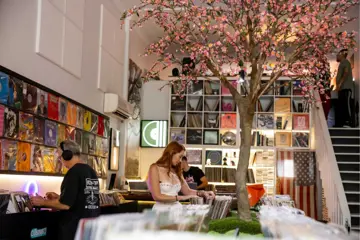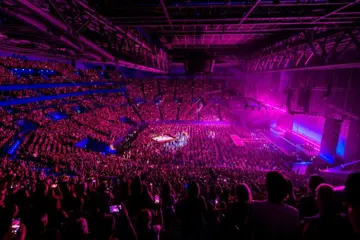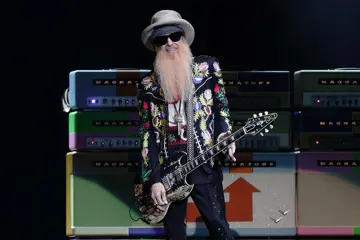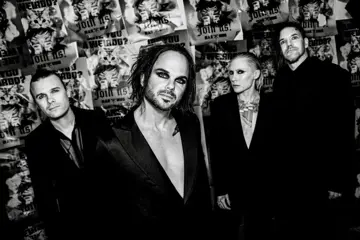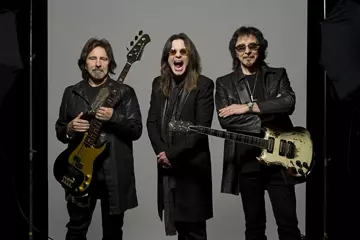In the first season of SBS's True Stories podcast series, seven of Australia's foremost emerging writers — Luke Carman, Maxine Beneba Clarke, Michael Mohammed Ahmad, Ellen van Neerven, Omar Musa, Tamar Chnorhokian and Cyrus Bezyan — revisit moments from their high school days.
Some would find it difficult to go back there; Clarke — whose story Chinese Straight details her hope that changing her hair would mean her peers accepted her and ceased bullying her — admits that she did.
"The section that I submitted is actually part of a memoir; so I've got a memoir that's coming out next year and I've been working on it for the last year or so but I hadn't actually written that section yet. So for me, when [SBS True Stories] contacted me and said, 'Look, would you like to do this?' I kind of sifted through in my mind: 'Ok, what piece would I write, what story would I write?' I kind of thought, this is a section that will be hard to write. So to do it for another project, and as something that's going to have audio and to be able to read it in my own voice is a challenge, but also I guess it made me write quite a difficult section."
"SBS is usually under criticism for working backwards when it comes to diversity..."
While Ahmad's story, Punchbowl Boys (also an excerpt from an upcoming novel, the follow-up to his 2014 debut The Tribe), has a more light-hearted and humorous tone to it, under the surface it deals with the issues that surrounded the school and community at the time in which it's set.
Don't miss a beat with our FREE daily newsletter
"My experience at high school — I think most students' experiences are quite traumatic," Ahmad begins. "I think being a Punchbowl boy in the late '90s is trauma in an extremely excessive context, and so it does conjure up memories, but that slightly assumes I've forgotten; I'm always there, so partly the reason why I write in the present tense is because I never got over it, it just keeps starting over in my mind. But I will say this as well: my particular story, it's set in a very specific context, so it's worth recognising that even though I'm speaking about it in the present tense and I'm speaking about it as though it's repeating itself like it's never stopped, it's important to remember that I'm really talking about Punchbowl during the late '90s and the early year 2000s within the context of some very serious sociopolitical issues surrounding the community. The [year] 2000 gang rapes that took place in the western suburbs of Sydney, the 9/11 attacks on New York City really impacted the psychology and the behavior of young Arab-Australian Muslim men who were feeling vilified and stigmatised and who were largely responding in a very conscious and critical and joyful way - most of the time. So I'm writing about that particular era and it's worth recognising that Punchbowl Boys [High School] has had quite a radical transformation over the last 15 years since those events... and I'm talking about a specific moment in time as a marker of western Sydney history."
Looking at the writers of the stories for True Stories Season One, all except one are writers of colour, and four of the seven (Clarke, Ahmad, van Neerven and Musa) were winners of this year's Sydney Morning Herald's Best Young Australian Novelists Award (the fifth recipient of the award being Alice Pung). Compared with the whiteness of Australian TV, for example, it seems like literary resources for young Australian people of all cultures are becoming more accessible and progressive. Clarke agrees, to an extent, but goes on to note that despite the diversity on the 2015 Best Young Australian Novelists list, "I don't think, as far as I know, that any of our books are actually on any school syllabuses, so I feel like the resources are there and the writers are definitely there and we're telling our stories more, we're more visible, but in terms of actually getting our work into the hands of kids like us — what we were kind of ten to 15 years ago — I think there's still a lot more work to be done."
Ahmad says there was nothing like True Stories around when he was in high school, stories that he felt he could relate to, "and still, to this day, it's very difficult". As well as being a writer, Ahmad is also the director of Western Sydney literacy movement group Sweatshop — indeed, Carman is the associate director and Chnorhokian's novel The Diet Starts On Monday was published by them.
"You know, we have been working for 15 years towards self-determination for marginalised communities in Australia, particularly from Sydney's west, of diverse backgrounds, who are coming to voice — which is an African American feminist term, which is about moving from silence to speech as a revolutionary gesture... because for as long as I've been critically conscious, it's always been a very mono-cultural landscape, Australian literature," explains Ahmad.
"SBS is usually under criticism for working backwards when it comes to diversity... probably the best example would be Struggle Street [the documentary series many criticised as "poverty porn" for the middle class]. But I think it's very important to remember that SBS is a very diverse organisation and the person that put this project together, Kylie Boltin... has very clear and very sophisticated understanding of working with diverse communities in a culturally sensitive way. This isn't a patronising attempt at recognising diversity — it's not like a group of people sat down and were like, 'We need a multicultural project where we have diverse voices'; we're actually seeing a very strong and very conscious shift in Australian literature.
"We're seeing an emergence of a new literary landscape which is starting to reflect what Australia really looks like."
"It's actually the first time really in Australian history that all of the Sydney Morning Herald Best Young Novelist Of The Year Award winners — and really any literary award in Australia — were people of colour, and so we're seeing a very radical shift in consciousness, we're seeing an emergence of a new literary landscape which is starting to reflect what Australia really looks like, which I think is very exciting."
For the True Stories podcasts, a sound designer took the writers' readings of their stories and incorporated sound effects and music to create a collaborative, immersive listening experience. It reminds the listener that in the age of e-books and audiobooks and lit purists lamenting 'the death of books', people tend to forget that storytelling began as an oral medium, and as Ahmad points out, many of the True Stories writers come from a background or culture that has a strong tradition of oral storytelling.
Despite being a slam poet, Clarke says reading the words of her story aloud, off the page, was quite a challenge. "Reading non-fiction is always more difficult for me; I mean, a lot of my poetry is non-fiction, but you know, when it's just a small slice, kind of a one-minute poem or something like that, I still find myself quite detached from it. So definitely I was quite apprehensive about the bit when you had to actually go into the studio and record the work in your own voice, because obviously you're telling a story that's true, on something that actually happened. But I think also there's a power to that; in a way you're testifying, you're saying, 'Look, this is something that happened to me,' and you're putting it out into the world and there's a kind of, not a validation, but people can then engage with it and hopefully will go away and think about some of the issues that you raised."
Interestingly, the high school theme of the first season of True Stories is an accompaniment to SBS's upcoming crime drama TV series, The Principal, which is set in a troubled Sydney boys' high school. By coincidence, Clarke was asked to profile one of the show's stars, Alex Dimitriades, for the Portrait section in The Saturday Paper, and therefore had the chance to preview a couple of episodes of the show. Her initial thoughts? "The issues in the series don't necessarily directly relate to the themes, but in terms of diversity, in terms of issues like bullying, in terms of just being teenagers finding your footing in that high school world, I think they all engage really well with the [True Stories] series."


